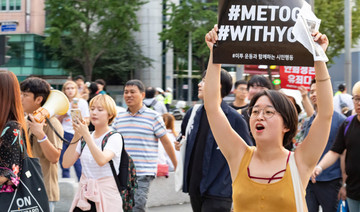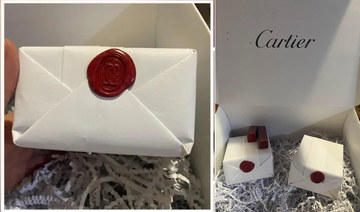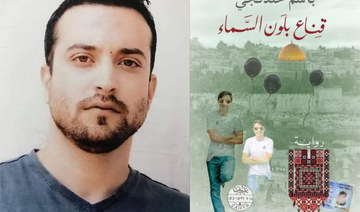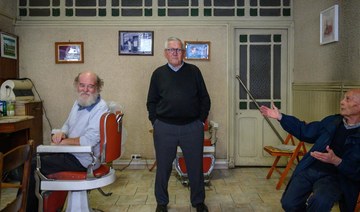When Wu Ke-xi was looking for a frightening plotline for her latest film, she didn’t need to look further than her own industry.
The Taiwanese actress and screenwriter’s latest movie, “Nina Wu,” is the story of an actress who, in pursuit of a role that will lead to stardom, is abused and psychologically scarred by a man in power.
Wu found herself closely following the #MeToo movement in Hollywood, and decided to write something for women affected by sexual assaults in the entertainment industry. Directed by Midi Z, it was selected to show at the Cannes Film Festival.
“After 2017, after the year the Harvey Weinstein stuff occurred, I read a lot of documents and interviews. I was so purely curious about what happened,” said Wu. She said she has been threatened in her career, but never sexually assaulted. “It’s still a humiliating experience,” she said.
“So I felt really connected to those women.”
Asia is having its own #MeToo moment, with its homegrown entertainment industries grappling with many of the issues that have upended entertainment careers in the United States and beyond.
Earlier this year, the K-pop scene was shaken when two male stars were accused of sexual misconduct in South Korea. Solo singer Jung Joon-young faced allegations he secretly filmed himself having sex with women and shared the footage on a mobile messenger app; he apologized to the victims. And Seungri, the youngest member of the quintet Big Bang, was accused of trying to steer sex services to business investors. He denied the charges and retired from the group.
Last year, in India, Bollywood actress Tanushree Dutta came forward with details of a 2008 complaint she filed against actor Nana Parekar for alleged sexual harassment, which he denied. A flood of stories of sexual harassment and assault followed on social media from Indian actresses and writers.
Indian actor, singer and filmmaker Farhan Akhtar, a United Nations “He For She” ambassador with his own “Men Against Rape and Discrimination” initiative, says there is unease in the industry.
“Fear runs down the spine of everyone, thinking that, ‘Oh my God, maybe I’ve done something in the past that might come back to bite me,’” he said.
He encourages other women to come forward and speak out.
“Nobody can do it for her. Nobody can out her story and put her in a position that maybe she doesn’t want to be in,” he said. “But when she does, then it’s important that people rally around her so that she feels she’s done the right thing. And through her, through that conversation, and through her words she will hopefully inspire, motivate many more people to come out. And that’s the way the system will be cleaned.”
Screenwriter Zhou Xiaoxuan did speak out. She became a central figure in China’s #MeToo movement after an essay she wrote privately, claiming she was sexually assaulted by a TV star, went public on the social media platform Sina Weibo last summer. A prominent television host, Zhu Jun, sued her for defamation and Zhou followed with her own suit, for infringing on her personal rights. Women’s rights advocates in China are following the case.
Zhou says the movement has only reached so far in China, affecting mostly a group of high-profile, well-connected men.
“They were frightened by the #MeToo trend and they stopped. But most people in this society, they’ve never heard of #MeToo,” she said.
“I’ve actually been lucky because Zhu Jun is well-known,” Zhou said. “It’s extremely difficult for women who have been assaulted by their friends, colleagues or partners to seek legal recourse.”
Japanese TV journalist Shiori Ito said she experienced months of trolling and shaming after she revealed in May 2017 that she had been raped. That was before the #MeToo movement got under way in the United States.
“I’m very grateful to all the other women that have spoken up because I felt very lonely,” she said. She said she has felt a change in Japan and in her own family “who were really against me speaking up, and then they started saying, ‘You know what, maybe she’s right.’“
An emotional television interview with South Korean prosecutor Seo Ji-hyun in January 2018, in which she said she had been assaulted eight years earlier, is credited with starting the #MeToo movement there. Seo has since won a court case for abuse of power against her alleged assaulter. She said that watching women reveal their stories in Hollywood helped give her the courage to speak publicly. Supporters marched in the streets with candles and #WithYou banners.
“I told myself that, ‘Yes, this was not my fault and that I should not be ashamed at all,’” she said.
In Pakistan, dancer, theater director and activist Sheema Kermani is campaigning against sexual abuse, trying to make the movement there more than a moment.
“When actresses, big actresses, started calling out big names of actors for sexual harassment, I think it gave Pakistani women and women in media . the courage to speak out,” she said.
In Thailand, model and TV personality Cindy Sirinya Bishop launched the “Don’t Tell Me How To Dress” campaign after receiving a wave of support for a “social media rant” — her response to an article advising women not to wear sexy clothes for the Thai New Year in order to avoid sexual assault.
“It all started when that clip that I posted went viral overnight with the support of many, many women all over Thailand, chiming in, commenting, sharing and saying ‘Yes, this is exactly what we feel.’ Why are we always the ones that have to cover up, or why, when we are harassed or assaulted, is it somehow our fault?” she said.
Bishop also created an exhibition displaying clothing worn by sexual-assault victims. “We have university student outfits to toddler’s clothing to sweatpants and T-shirts,” she said.
She says her movement would have happened regardless of the stories arriving from America. But she adds: “In some way, the #MeToo movement has collectively empowered women without our knowing it, all over the world.”
Asian entertainment industries grappling with #MeToo issues
Asian entertainment industries grappling with #MeToo issues
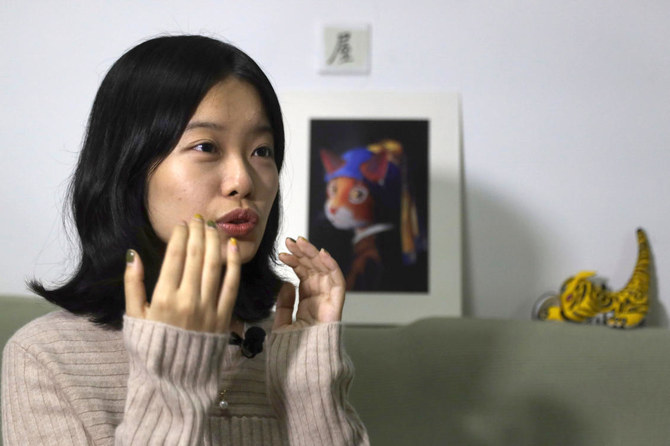
- Asia is having its own #MeToo moment, with its homegrown entertainment industries grappling with many of the issues
- “Nina Wu,” is the story of an actress who, in pursuit of a role that will lead to stardom, is abused and psychologically scarred by a man in power
A 98-year-old in Ukraine walked miles to safety from Russians, with slippers and a cane
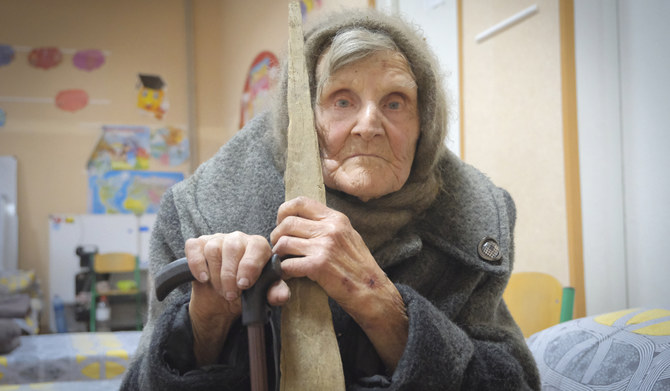
- Describing her journey, the nonagenarian said she had fallen twice and was forced to stop to rest at some points, even sleeping along the way before waking up and continuing her journey
KYIV, Ukraine: A 98-year-old woman in Ukraine who escaped Russian-occupied territory by walking almost 10 kilometers (6 miles) alone, wearing a pair of slippers and supported by a cane has been reunited with her family days after they were separated while fleeing to safety.
Lidia Stepanivna Lomikovska and her family decided to leave the frontline town of Ocheretyne, in the eastern Donetsk region, last week after Russian troops entered it and fighting intensified.
Russians have been advancing in the area, pounding Kyiv’s depleted, ammunition-deprived forces with artillery, drones and bombs.
“I woke up surrounded by shooting all around — so scary,” Lomikovska said in a video interview posted by the National Police of Donetsk region.
In the chaos of the departure, Lomikovska became separated from her son and two daughters-in-law, including one, Olha Lomikovska, injured by shrapnel days earlier. The younger family members took to back routes, but Lydia wanted to stay on the main road.
With a cane in one hand and steadying herself using a splintered piece of wood in the other, the pensioner walked all day without food and water to reach Ukrainian lines.
Describing her journey, the nonagenarian said she had fallen twice and was forced to stop to rest at some points, even sleeping along the way before waking up and continuing her journey.
“Once I lost balance and fell into weeds. I fell asleep … a little, and continued walking. And then, for the second time, again, I fell. But then I got up and thought to myself: “I need to keep walking, bit by bit,’” Lomikovska said.
Pavlo Diachenko, acting spokesman for the National Police of Ukraine in the Donetsk region, said Lomikovska was saved when Ukrainian soldiers spotted her walking along the road in the evening. They handed her over to the “White Angels,” a police group that evacuates citizens living on the front line, who then took her to a shelter for evacuees and contacted her relatives.
“I survived that war,’ she said referring to World War II. “I had to go through this war too, and in the end, I am left with nothing.
“That war wasn’t like this one. I saw that war. Not a single house burned down. But now – everything is on fire,” she said to her rescuer.
In the latest twist to the story, the chief executive of one of Ukraine’s largest banks announced on his Telegram channel Tuesday that the bank would purchase a house for the pensioner.
“Monobank will buy Lydia Stepanivna a house and she will surely live in it until the moment when this abomination disappears from our land,” Oleh Horokhovskyi said.
Amazon Purr-rime: Cat accidentally shipped to online retailer
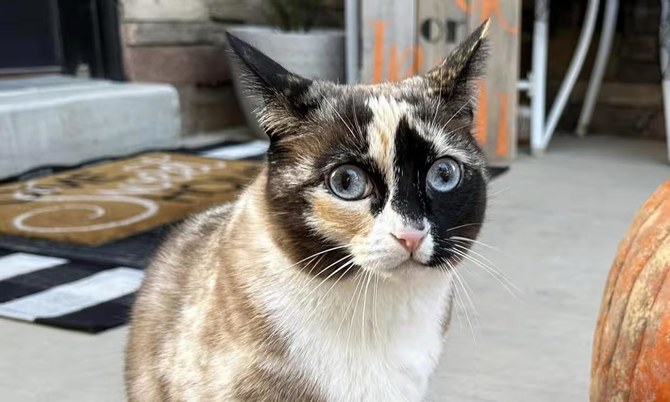
- Galena was found safe by a warehouse worker at an Amazon center after vanishing from her home in Utah
LOS ANGELES: A curious cat that sneaked into an open box was shipped across the United States to an Amazon warehouse after its unknowing owners sealed it inside.
Carrie Clark’s pet, Galena, vanished from her Utah home on April 10, sparking a furious search that involved plastering “missing” posters around the neighborhood.
But a week later, a vet hundreds of miles (kilometers) away in Los Angeles got in touch to say the cat had been discovered in a box — alongside several pairs of boots — by a warehouse worker at an Amazon center.
“I ran to tell my husband that Galena was found and we broke down upon realizing that she must have jumped into an oversized box that we shipped out the previous Wednesday,” Clark told KSL TV in Salt Lake City.
“The box was a ‘try before you buy,’ and filled with steel-toed work boots.”
Clark and her husband jetted to Los Angeles, where they discovered Amazon employee Brandy Hunter had rescued Galena — a little hungry and thirsty after six days in a cardboard box, but otherwise unharmed.
“I could tell she belonged to someone by the way she was behaving,” said Hunter, according to Amazon.
“I took her home that night and went to the vet the next day to have her checked for a microchip, and the rest is history.”
What did people eat before agriculture? New study offers insight
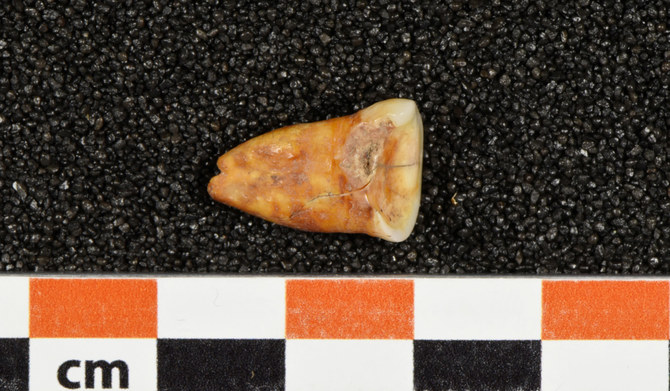
- Analysis of forms — or isotopes — of elements including carbon, nitrogen, zinc, sulfur and strontium in these remains indicated the type and amount of plants and meat they ate
WASHINGTON: The advent of agriculture roughly 11,500 years ago in the Middle East was a milestone for humankind — a revolution in diet and lifestyle that moved beyond the way hunter-gatherers had existed since Homo sapiens arose more than 300,000 years ago in Africa.
While the scarcity of well-preserved human remains from the period preceding this turning point has made the diet of pre-agricultural people a bit of a mystery, new research is now providing insight into this question. Scientists reconstructed the dietary practices of one such culture from North Africa, surprisingly documenting a heavily plant-based diet.
The researchers examined chemical signatures in bones and teeth from the remains of seven people, as well as various isolated teeth, from about 15,000 years ago found in a cave outside the village of Taforalt in northeastern Morocco. The people were part of what is called the Iberomaurusian culture.
Analysis of forms — or isotopes — of elements including carbon, nitrogen, zinc, sulfur and strontium in these remains indicated the type and amount of plants and meat they ate. Found at the site were remains from different edible wild plants including sweet acorns, pine nuts, pistachio, oats and legumes called pulses. The main prey, based on bones discovered at the cave, was a species called Barbary sheep.
“The prevailing notion has been that hunter-gatherers’ diets were primarily composed of animal proteins. However, the evidence from Taforalt demonstrates that plants constituted a big part of the hunter-gatherers’ menu,” said Zineb Moubtahij, a doctoral student in archaeology at the Max Planck Institute for Evolutionary Anthropology in Germany and lead author of the study published on Monday in the journal Nature Ecology & Evolution.
“It is important as it suggests that possibly several populations in the world already started to include substantial amount of plants in their diet” in the period before agriculture was developed, added archeogeochemist and study co-author Klervia Jaouen of the French research agency CNRS.
The Iberomaurusians were hunter-gatherers who inhabited parts of Morocco and Libya from around 25,000 to 11,000 years ago. Evidence indicates the cave served as a living space and burial site.
These people used the cave for significant portions of each year, suggesting a lifestyle more sedentary than simply roaming the landscape searching for resources, the researchers said. They exploited wild plants that ripened at different seasons of the year, while their dental cavities illustrated a reliance on starchy botanical species.
Edible plants may have been stored by the hunter-gatherers year-round to guard against seasonal shortages of prey and ensure a regular food supply, the researchers said.
These people ate only wild plants, the researchers found. The Iberomaurusians never developed agriculture, which came relatively late to North Africa.
“Interestingly, our findings showed minimal evidence of seafood or freshwater food consumption among these ancient groups. Additionally, it seems that these humans may have introduced wild plants into the diets of their infants at an earlier stage than previously believed,” Moubtahij said.
“Specifically, we focused on the transition from breastfeeding to solid foods in infants. Breast milk has a unique isotopic signature, distinct from the isotopic composition of solid foods typically consumed by adults.”
Two infants were among the seven people whose remains were studied. By comparing the chemical composition of an infant’s tooth, formed during the breastfeeding period, with the composition of bone tissue, which reflects the diet shortly before death, the researchers discerned changes in the baby’s diet over time. The evidence indicated the introduction of solid foods at around the age of 12 months, with babies weaned earlier than expected for a pre-agricultural society.
North Africa is a key region for studying Homo sapiens evolution and dispersal out of Africa.
“Understanding why some hunter-gatherer groups transitioned to agriculture while others did not can provide valuable insights into the drivers of agricultural innovation and the factors that influenced human societies’ decisions to adopt new subsistence strategies,” Moubtahij said.
Palestinian prisoner in Israel wins top fiction prize
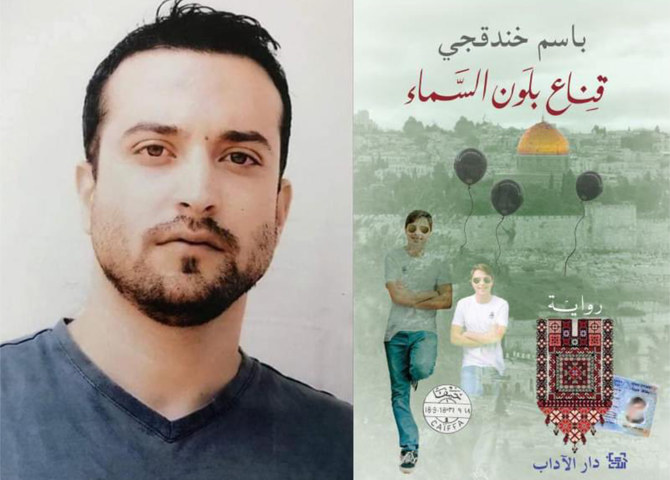
- The mask in the novel’s title refers to the blue identity card that Nur, an archaeologist living in a refugee camp in Ramallah, finds in the pocket of an old coat belonging to an Israeli
ABU DHABI: Palestinian writer Basim Khandaqji, jailed 20 years ago in Israel, won a prestigious prize for Arabic fiction on Sunday for his novel “A Mask, the Color of the Sky.”
The award of the 2024 International Prize for Arabic Fiction was announced at a ceremony in Abu Dhabi.
The prize was accepted on Khandaqji’s behalf by Rana Idriss, owner of Dar Al-Adab, the book’s Lebanon-based publisher.
Khandaqji was born in the Israeli-occupied West Bank city of Nablus in 1983, and wrote short stories until his arrest in 2004 at the age of 21.
He was convicted and jailed on charges relating to a deadly bombing in Tel Aviv, and completed his university education from inside jail via the Internet.
The mask in the novel’s title refers to the blue identity card that Nur, an archaeologist living in a refugee camp in Ramallah, finds in the pocket of an old coat belonging to an Israeli.
Khandaqji’s book was chosen from 133 works submitted to the competition.
Nabil Suleiman, who chaired the jury, said the novel “dissects a complex, bitter reality of family fragmentation, displacement, genocide, and racism.”
Since being jailed Khandaqji has written poetry collections including “Rituals of the First Time” and “The Breath of a Nocturnal Poem.”
He has also written three earlier novels.
Mexican doctor claims victory in $28 Cartier earrings battle
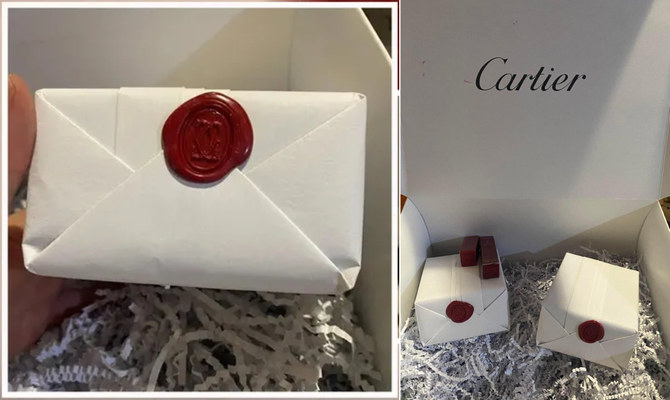
MEXICO CITY: A Mexican man has claimed a victory over French luxury brand Cartier, saying an error allowed him to buy two pairs of earrings for $28 that were supposed to cost nearly $28,000.
After a four-month struggle, doctor Rogelio Villarreal said he had finally received the jewelry, which he accused the company of refusing to deliver after his online purchase in December.
According to Villarreal, he came across the low-priced earrings while browsing Instagram.
“I swear I broke out in a cold sweat,” he wrote on the social media platform X.
Cartier declined to recognize the purchase and offered Villarreal a refund, as well as a bottle of champagne and a passport holder as compensation, according to a company letter shared by the doctor.
But Villarreal refused and decided to take the case to Mexico’s consumer protection agency, which ruled in favor of the doctor.
Cartier accepted the decision, Villarreal announced.
“War is over. Cartier is complying,” he wrote.



